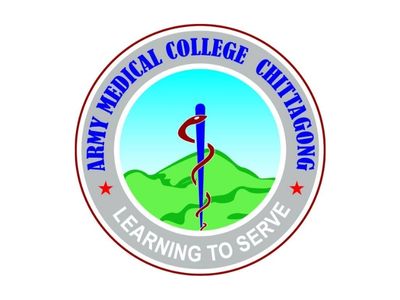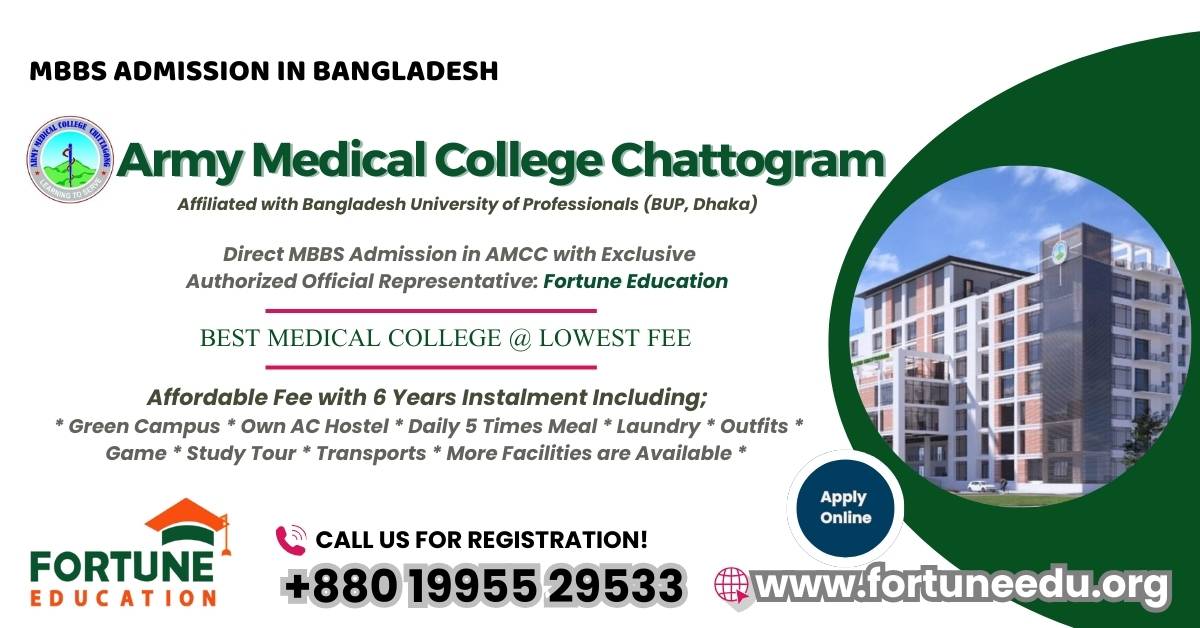
Army Medical College Chattogram (AMCC) is a military-administered medical institution established in 2014, operating under the Bangladesh Armed Forces and affiliated with the Bangladesh University of Professionals (BUP). The institution is located within the Chattogram Cantonment, a high-security military zone that provides a disciplined, structured academic environment.
AMCC offers a five-year Bachelor of Medicine and Bachelor of Surgery (MBBS) degree, followed by a one-year compulsory internship. The academic program is governed by the Bangladesh Medical and Dental Council (BMDC), and the curriculum is delivered entirely in English, making it highly accessible to international students from countries such as India, Nepal, Sri Lanka, and several African and Southeast Asian nations.

The curriculum is structured into multiple academic phases, covering pre-clinical, para-clinical, and clinical disciplines. International students benefit from a globally aligned curriculum, modern laboratory infrastructure, military-standard discipline, and a secure learning environment.
The MBBS curriculum at AMCC is designed and implemented in compliance with the guidelines of the BMDC and Directorate General of Health Services (DGHS), ensuring compatibility with medical education standards recognized by global regulatory bodies such as:
National Medical Commission (NMC), India
General Medical Council (GMC), UK
Educational Commission for Foreign Medical Graduates (ECFMG), USA
World Directory of Medical Schools (WDOMS)
The course content is based on a phase-wise modular structure, intended to develop foundational knowledge, clinical skills, ethical reasoning, and professional competence.
All lectures, laboratory instructions, practicals, tutorials, and examinations at AMCC are conducted in English. Academic materials, including textbooks, journals, and teaching aids, are sourced from internationally accepted references.
This facilitates ease of transition for international students who must later sit for licensure examinations such as FMGE (India), PLAB (UK), or USMLE (USA), which are all conducted in English.
The MBBS curriculum is divided into three broad phases, each focusing on specific domains of medical education:
Duration: 1 year
Subjects:
Anatomy: Gross anatomy, histology, embryology, and neuroanatomy.
Physiology: General physiology, systems physiology, hematology.
Biochemistry: Cellular metabolism, enzymology, clinical biochemistry.
Focus:
Understanding human structure and function at the cellular and organ level.
Introduction to basic clinical terminology and medical ethics.
Assessment:
Written exams, vivas, and practical lab-based assessments.
Internal assessments carry weight in final professional examination.
Duration: 2 years
Subjects:
Pathology: General pathology, systemic pathology, hematopathology.
Microbiology: Bacteriology, virology, mycology, immunology.
Pharmacology: Principles of pharmacokinetics and pharmacodynamics, drug mechanisms.
Community Medicine: Public health, epidemiology, health education.
Forensic Medicine: Legal responsibilities, autopsy methods, medico-legal documentation.
Focus:
Bridging basic science knowledge with disease mechanisms and community health principles.
Initiation of hospital exposure through community visits and observational training.
Assessment:
Cumulative theoretical and practical exams.
Logbook-based evaluations and project presentations in community health.
Duration: 2 years
Subjects:
Medicine and Allied Subjects: General medicine, cardiology, neurology, dermatology.
Surgery and Allied Subjects: General surgery, orthopedics, anesthesiology, urology.
Gynecology & Obstetrics: Reproductive health, labor, family planning.
Pediatrics: Neonatology, child development, immunization.
ENT, Ophthalmology, Psychiatry, and Emergency Medicine
Focus:
Clinical rotations in military hospitals affiliated with AMCC.
Emphasis on clinical reasoning, patient interaction, diagnostic skills, and surgical techniques.
Assessment:
Practical, oral (viva), and written evaluations.
Continuous internal assessments and logbook maintenance are critical for final results.
After the five academic years, graduates must complete a one-year rotating internship to qualify for full registration with the BMDC. The internship includes:
Rotations across departments such as Surgery, Medicine, Pediatrics, Gynecology, and Emergency.
Active participation in ward duties, outpatient departments (OPDs), and night shifts.
Supervision by clinical faculty and military hospital specialists.
Completion of the internship is mandatory before applying for national or international licensing exams.
Student evaluation at AMCC is conducted through a mix of formative (internal) and summative (professional) examinations. Each subject has a weightage distribution across theory, practicals, and oral components.
Attendance and class performance
Term tests, assignments, and viva voce
Practical and clinical examination performance
Nationally conducted and supervised by BUP and BMDC
Written papers (MCQs and SAQs)
OSPE/OSCE (Objective Structured Clinical/Practical Examinations)
Viva voce with internal and external examiners
A minimum of 60% in both theory and practicals is required to pass each subject.
One of the most integral components of the MBBS program at Army Medical College Chattogram (AMCC) is its structured clinical training, which begins from the third phase of the curriculum and intensifies in the final academic years. This hands-on clinical exposure is conducted through affiliations with Military Hospitals and Combined Military Hospitals (CMHs) under the Bangladesh Armed Forces.
Direct Patient Interaction: Students engage in bedside clinics, case presentations, and differential diagnosis under faculty guidance.
Clinical Rotations: Scheduled across departments such as General Medicine, Surgery, Pediatrics, Orthopedics, Psychiatry, Dermatology, ENT, Ophthalmology, and Emergency Medicine.
Logbook Documentation: Students are required to maintain detailed logs of clinical encounters, which are evaluated during assessments.
Ward Assignments: Involving real-time patient monitoring, medical documentation, and case analysis.
Clinical Skills Laboratories: Mannequin-based and simulation models are used for practicing resuscitation, IV line placement, catheterization, and basic surgical techniques.
The clinical training strictly adheres to BMDC’s competency-based approach, ensuring that international students are trained to handle real-world patient care scenarios in diverse healthcare systems.
AMCC is equipped with state-of-the-art labs and digital learning resources to support both theoretical knowledge and practical proficiency. These facilities play a critical role in the pre-clinical and para-clinical years and remain accessible for higher-year reference and project work.
Anatomy Dissection Hall: Cadaver-based training supported by 3D anatomical models and virtual dissection tools.
Physiology Lab: For muscle, nerve, cardiovascular, respiratory, and neurophysiological experiments.
Biochemistry Lab: Hands-on biochemical tests and analysis relevant to clinical diagnostics.
Pathology and Histopathology Labs: Microscopy-based diagnosis and tissue analysis for disease identification.
Microbiology and Immunology Labs: Culture techniques, serological tests, and infection control training.
Lecture Recording System: Enables students to review missed classes.
Digital Library Access: Subscribed access to PubMed, Medline, and BMJ databases.
E-Learning Modules: Standardized presentations, case studies, and quizzes.
International students are provided IT orientation and lab usage protocols upon enrollment.
Faculty at AMCC are recruited through military and national medical education channels. They are certified by BUP and BMDC, with several holding advanced international degrees. Teaching staff includes professors, associate professors, assistant professors, and demonstrators who are responsible for both classroom instruction and clinical mentoring.
Individual Academic Advisors: Each student is assigned a faculty advisor for personal academic tracking.
Remedial Support: Students struggling academically are enrolled in focused remedial teaching programs.
Small Group Tutorials: Reinforce classroom concepts and facilitate doubt clarification in smaller peer groups.
Clinical Mentors: Supervisors in each rotation department guide students in clinical judgment, patient safety, and ethics.
AMCC maintains a favorable student-to-teacher ratio, which ensures individualized attention, especially important for foreign students adjusting to a new academic system.
Although research is not a mandatory component of the undergraduate curriculum, students are encouraged to participate in departmental research, case studies, and community-based surveys. This offers a foundation for postgraduate medical research and helps build international application profiles.
Research-related activities include:
Case Reports and Clinical Audits under faculty supervision.
Community Health Surveys as part of the Community Medicine module.
Seminar Presentations on medical topics and disease outbreaks.
Participation in Medical Conferences, both national and regional.
AMCC also promotes awareness of research ethics and publication protocols.
AMCC graduates intending to practice medicine outside Bangladesh must pass local licensure exams such as FMGE/NExT (India), PLAB (UK), or USMLE (USA). The college’s English-based curriculum and clinical exposure support these goals.
Indian students must qualify the Foreign Medical Graduate Examination or upcoming National Exit Test.
AMCC is NMC-approved, and the curriculum satisfies all core requirements.
Fortune Education often provides guidance on post-MBBS registration and documentation.
Graduates may apply for PLAB 1 and PLAB 2, the licensing exam administered by the General Medical Council (GMC).
AMCC’s listing in the World Directory of Medical Schools makes graduates eligible to apply for GMC registration, provided they pass the English language proficiency tests (IELTS/OET).
Students aiming to pursue residency or practice in the United States must pass USMLE Step 1 and Step 2 CK.
AMCC’s pre-clinical and clinical curriculum aligns with ECFMG requirements, and preparatory resources are available on campus.
In addition to formal academics, AMCC encourages participation in structured extracurricular initiatives to enhance leadership, communication, and teamwork skills:
Debate and Quiz Competitions
Medical Ethics Workshops
Simulation-based Emergency Drills
Cultural Events and National Day Celebrations
Military Physical Training (for interested students)
These initiatives are supervised by faculty and aim to promote soft skills and confidence among future physicians.
The MBBS academic year is divided into two semesters, with professional examinations held at the end of each phase. Clinical postings run in parallel with theory classes in the later phases.
January to June: First Semester
July to December: Second Semester
Professional Exams: Conducted at the end of the relevant phase
Supplementary Exams: Conducted for repeaters within 3 months
International students receive a detailed academic planner during orientation, and Fortune Education ensures their compliance with visa validity in accordance with the academic calendar.
1. Is the MBBS curriculum at AMCC recognized internationally?
Yes. The MBBS program at AMCC is regulated by BMDC and BUP and recognized by WDOMS, making graduates eligible for FMGE, PLAB, USMLE, and other licensing exams globally.
2. How much clinical exposure do students receive during MBBS?
Clinical exposure begins in the 3rd year and increases through rotations across multiple departments. Students engage in real-time patient care under clinical supervisors in military-affiliated hospitals.
3. Are foreign students trained in English or Bengali?
All academic instruction, clinical teaching, and examinations are conducted in English. Bangla may be used with patients during clinical rotations, but faculty offer translation support for international students.
4. Are there research opportunities during MBBS at AMCC?
Yes. Though optional, students can participate in research projects, community health studies, and seminars. Research experience is beneficial for postgraduate applications abroad.
5. Can students prepare for international licensing exams while studying?
Yes. AMCC’s curriculum supports simultaneous preparation for FMGE, PLAB, and USMLE. Academic advisors and alumni often provide guidance on exam strategies and application processes.